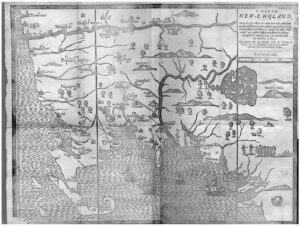Nov 1, 2023
Today we know the area around Scarborough, Maine, as a vacation retreat. In 1677 the area was the part of Massachusetts Bay Colony known as Black Point. In those years of the King Philip War, this was the easternmost settlement in the providence of Maine. The local natives, after years of peaceful relations with the settlers, struck back with fighting breaking out between the settlers and the natives. Even though the death of King Philip a year earlier had ended the fighting down in Massachusetts Bay Colony, hostilities continued in this easternmost part of the colony. On June 29, 1677, three ships of war lay off the coast of Black Point, having arrived the day before. In them, led by Captain Swett, were men gathered from towns of the Massachusetts Bay Colony. Among those men landing on that rocky coast was Benjamin Rockwood of Medfield.

Benjamin’s was one of a half-dozen Medfield births recorded in 1651, the first year of Medfield’s status as an official town. He was the son of Nicolas and Jane Rockwood who arrived here from Braintree with others from Braintree and Weymouth, where they took up house lots on Bridge Street. Benjamin’s mother died when he was but three years old and his father remarried two years later.
At the age of 26 Benjamin found himself up in this remote part of Massachusetts, landing with some 90 other troops at Black Point. The next morning heavy fighting broke out when the English soldiers were caught in an ambush by attacking natives. “ A great numbers of Indians, rising with a war-whoop, fired at once upon Captain Swett’s men, and turning so violently and so suddenly upon them, threw the young and undisciplined soldiers into confusion. Capt. Swett with a few of his experienced men, fought bravely on, retreating towards the fort, when he was killed.”
Sixty of the soldiers were killed or wounded that June day. Among those wounded was Benjamin Rockwood. According to reports of the attack written later by Rev. Nathaniel Gookin, “…the government had committed a great error in sending a force so inadequate to the work to be done. Not only was the number of men sent far too small, but many, even of that small number, were young, raw, and inexperienced soldiers, not able to look danger, much less death, calmly in the face.”
Benjamin Rockwell was sent down to Salem, Massachusetts, to recover, having taken two shots to the thigh. Here he stayed for three months before he could be removed to Medfield. Benjamin returned to Medfield, married Judith Ellis and the two had five children over a nine-year period but Benjamin never fully recovered from his wounds.
Throughout his life he was in habitual ill health, constantly dependent upon others. Despite his service in the Battle at Black Point, he had received no pay and was forced finally to live in the care of his daughter Bethia and son-in-law William Mann at their home in Wrentham. At the age of 91 Benjamin sent a petition to the Massachusetts General Court requesting financial assistance on account of his service to Massachusetts during the King Philip War. The court granted him four pounds a year for the rest of his life. (This roughly translates to $400 per year in today’s dollars.) Benjamin died five years later.
To learn more about this historic battle, read A Doleful Slaughter Near Black Point – The Battle at Moore’s Brook by Sumner Hunnewell, which was published in The Maine Genealogist in May and Aug. 2003 and appears on the Scarborough Historical Society website.